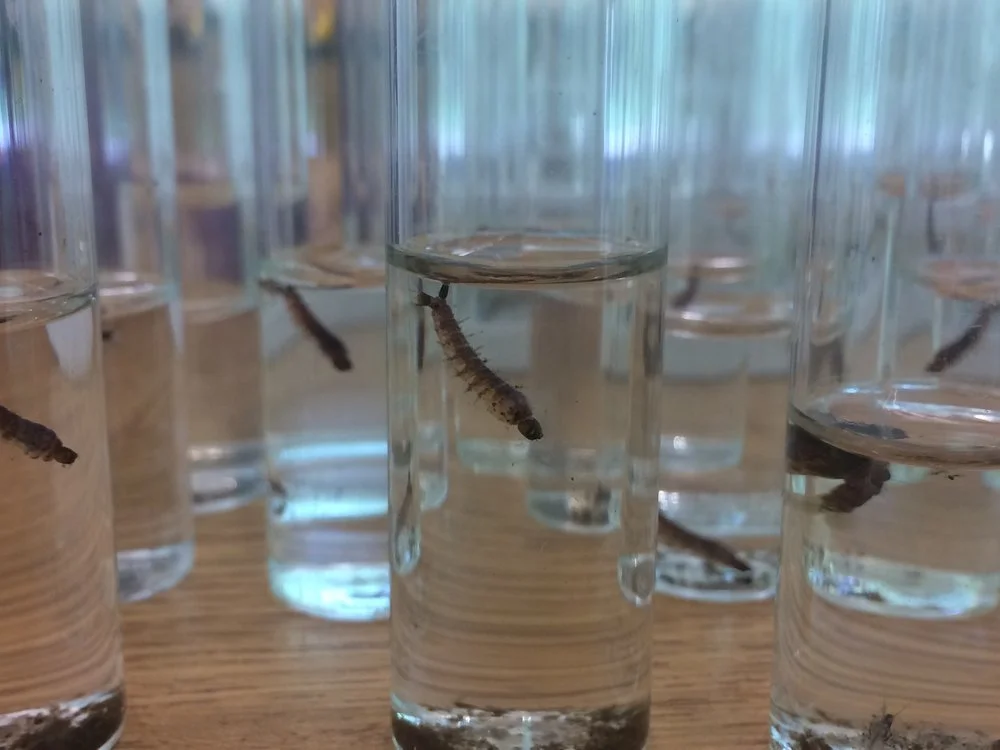research team mentors
Co-Principal Investigator
Katie Westby, PhD (Biology), MSPH
Vector/Disease Ecologist, Tyson Research Center
Lab website: katiewestbymosquito.com
StLUEE: Urban Ecology and Evolution Working Group
Email: kwestby@wustl.edu
Co-Principal Investigator
Kim A. Medley, PhD (Conservation Biology)
Director, Tyson Research Center
Lab website: Medleylabgroup.com
StLUEE: Urban Ecology and Evolution Working Group
Email: kim.medley@wustl.edu
Tom Radomski, PhD (Ecology, Evolution, Behavior)
Postdoctoral Research Associate, Tyson Research Center
Email: radomski@wustl.edu
Lauren Johnson, BS (Biology)
PhD Candidate, Ecology and Evolutionary Biology program
Washington University in St. Louis
Email: johnson.l.e@wustl.edu
Research focus for summer 2024
Mosquitoes have been pervasive elements of landscapes and human societies for millennia, causing severe disease outbreaks and influencing the outcomes of major conflicts. To understand how mosquitoes transmit disease, it is critical to understand their ecology and evolution – why mosquitoes and their pathogens are where they are.
Our lab is interested in how interactions between mosquitoes and their environment (abiotic and biotic) influence the geography, abundance, and survival of mosquitoes from both ecological and evolutionary perspectives. We use a variety of tools to address basic and applied questions, and many of our projects combine lab- and field-based experiments. We also venture into the broader world of insect ecology, and have a project underway studying insect diversity in prairies.
Our projects for summer 2024 include:
Urban ecology of the invasive Tiger mosquito: This mosquito has thrived in urban habitat since it was introduced into the US in the mid-1980s. We have set out to investigate what makes this species so good at utilizing cities, while also testing the role of urban habitat in shaping its evolutionary trajectory. We are currently digging deeper into the effects of light pollution and urban heat on mosquito behavior and life-history traits.
Light pollution: Light is an essential biological signal for the world's flora and fauna. With widespread artificial lighting at night (ALAN) due to urbanization and human settlement, most flora and fauna are experiencing unnatural lighting signals that could impact their behavior and development. We have multiple studies and experiments aiming to understand how ALAN impacts the behavior and development of the invasive Tiger mosquito, a dominant day-time active mosquito species in cities across the globe.
Heat tolerance and climate change: As temperatures increase with climate change, it’s important to understand how mosquitoes – important vectors of human and wildlife disease – will respond. We have multiple studies currently underway studying heat and desiccation tolerance of the invasive Tiger mosquito in the Saint Louis region. The current focus is on how mosquitoes use different microclimates in the field and quantifying the upper thermal limits of important behaviors such as host and mate seeking.
Insect diversity and habitat structure: Worldwide insect declines have spurred numerous studies investigating the factors contributing biodiversity loss. In collaboration with Kasey Fowler-Finn and Cristy Portales-Reyes (Saint Louis University), we will study the relationship between insect diversity – as measured by the diversity of vibrational acoustic calls – together with habitat structure to determine the relationship between 3-dimensional structure and diversity.
Skills
techniques
methods
In our lab, we work to foster an inclusive and collaborative environment. We value the ideas our fellows and apprentices bring to the conversation and take our roles as mentors very seriously. Fellows can expect to gain exposure to multiple aspects of the scientific process from experimental design, to collecting and curating data, to presenting results. Independent research projects are encouraged for motivated students.
Skills learned will likely include trapping and collecting mosquitoes and other insects in the field, multiple laboratory assays, identifying insect species using microscopy, maintenance of mosquito colonies, and geospatial techniques.
research conditions
Fellows can expect to split their time between field and lab work. The ratio will depend on the nature of independent projects that are pursued, but currently planned research will be approximately 50/50 field/lab. Field conditions range from kneeling and sorting through larval mosquito habitats to hiking in rugged terrain to driving to field sites throughout the St. Louis region and collecting mosquitoes during the hottest part of the day. Our work studying light pollution will also require students to have a modified work day during certain periods of the summer (e.g., 12 pm – 8 pm). Details can be further discussed during interviews.
Team structure and opportunities for independent research
Our summer research group will be composed of the principal investigators (PIs Westby and Medley), fourth-year graduate student Lauren Johnson, postdoc Tom Radomski, multiple undergraduate fellows, and two high school apprentices. Students are mentored directly on day-to-day work, and the lab meets with the PIs weekly (usually in the form of a lab lunch); fellows are encouraged to meet with the PIs as needed.
Independent research projects are encouraged for motivated students, with close guidance from your mentors and feedback from the Tyson community as desired. Fellows conducting independent projects can expect to design their own study, analyze the data, and potentially publish their work in peer-reviewed journals. We welcome students who are interested in conducting research in our lab that leads to a senior thesis.









